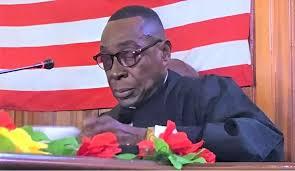Liberia: Supreme Court Orders Judge’s Recusal in Tweah Corruption Case, Raising Questions of Judicial Integrity

Monrovia, Liberia – In a significant legal development, Liberia’s Supreme Court has ordered the recusal of Judge Blamo Dixon from the corruption case involving former Finance Minister Samuel Tweah and others. The decision has ignited debates over judicial impartiality and potential political motivations behind the government’s actions.
The Supreme Court’s decision, delivered by Justice Yamie Quiqui Gbeisay, follows allegations of bias against Judge Dixon, who was accused of making prejudicial comments favoring the defendants. The court’s ruling underscores the judiciary’s critical role in maintaining fairness and upholding the right to a fair trial for all parties involved.
Concerns Over Judicial Bias
Justice Gbeisay emphasized the importance of an unbiased judiciary, particularly in high-profile cases.
“The law mandates that judges must not only be impartial but must also appear to be so,” Gbeisay stated, highlighting the damaging implications of perceived judicial bias on public trust in the legal system.
The Supreme Court condemned Judge Dixon’s comments, describing them as prejudicial and detrimental to the prosecution’s ability to present its case fairly.
Allegations of Political Motives
The corruption charges against Tweah and his co-defendants have drawn criticism, with some labeling the case as politically motivated. Critics argue that the government’s actions reflect an attempt to use judicial power as a means of political retribution against prominent figures.
The Supreme Court’s ruling has cast a spotlight on the government’s tactics, raising concerns about transparency and accountability in its pursuit of justice.
Defense Attorneys Welcome Ruling
Defense attorneys have applauded the Supreme Court’s decision, viewing it as a victory for judicial integrity and the rule of law. With the case now expected to transition to a new judge, they hope for a fairer legal process moving forward.
Implications for Liberia’s Judicial Landscape
This ruling marks a critical moment for Liberia’s legal system, as it underscores the necessity of safeguarding judicial impartiality and holding government actions to account. The case could potentially reshape public perceptions of legal accountability in the country, reinforcing the judiciary’s role as a check on executive power.
As the case proceeds under new judicial oversight, all eyes remain on how Liberia’s legal institutions navigate this high-stakes trial, which has broader implications for the country’s commitment to justice and fairness.
- Vibnix Blog
- Politics
- News
- Liberia News
- Entertainment
- Technology
- Educação
- Art
- Causes
- Crafts
- Dance
- Drinks
- Film
- Fitness
- Food
- Jogos
- Gardening
- Health
- Início
- Literature
- Music
- Networking
- Outro
- Party
- Religion
- Shopping
- Sports
- Theater
- Wellness


